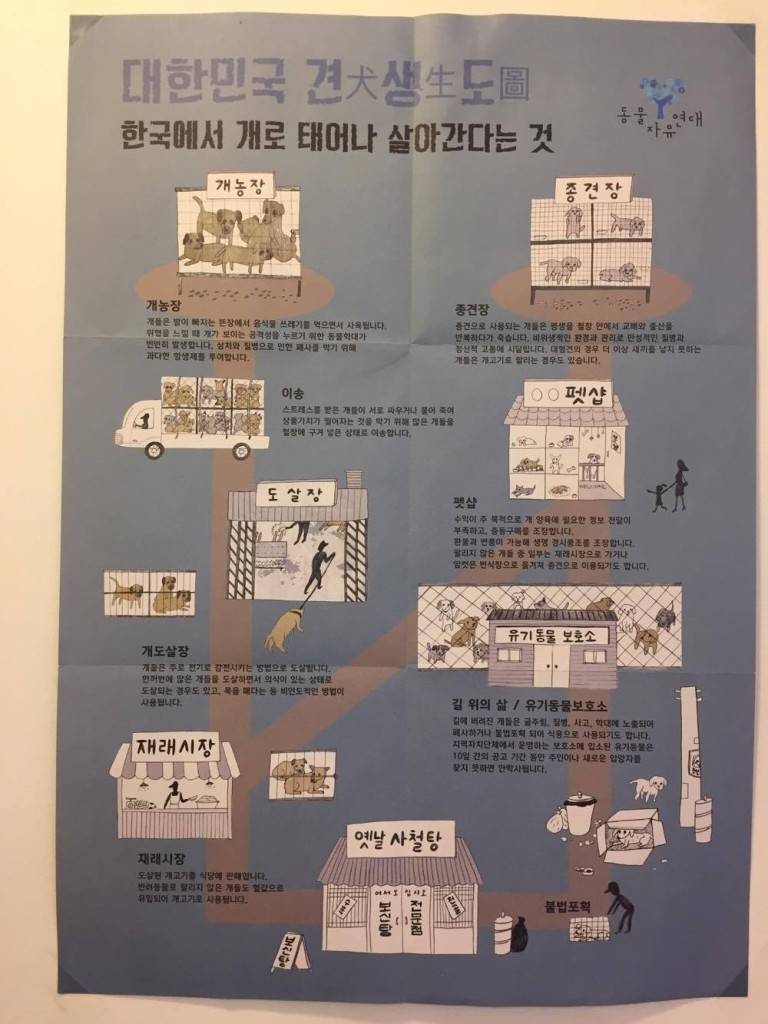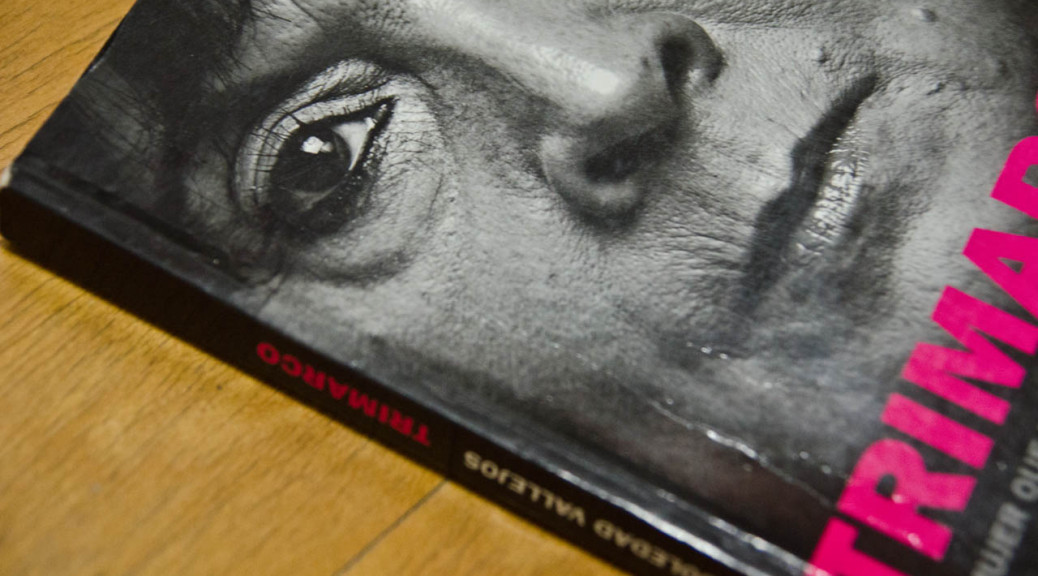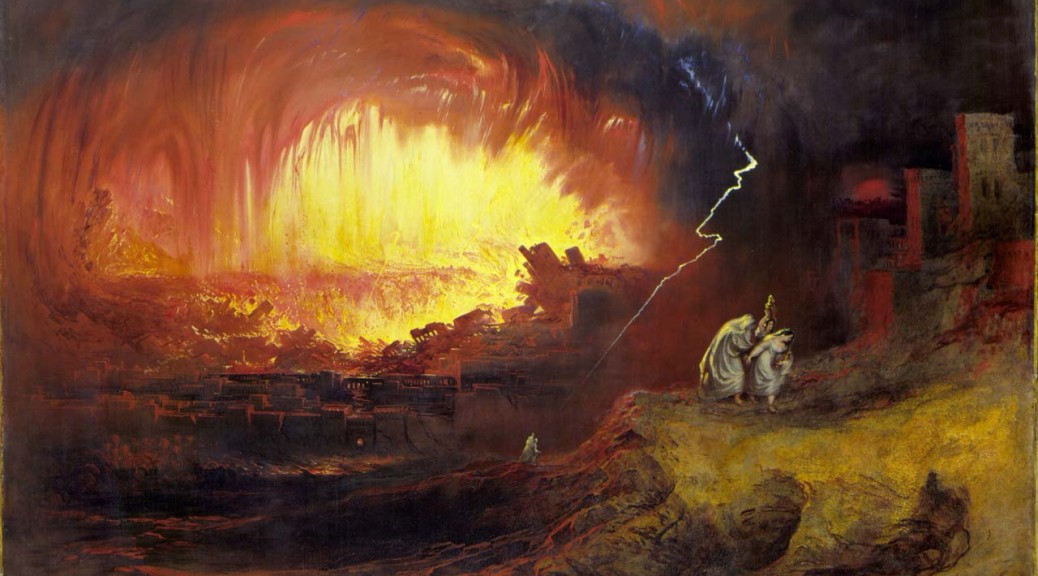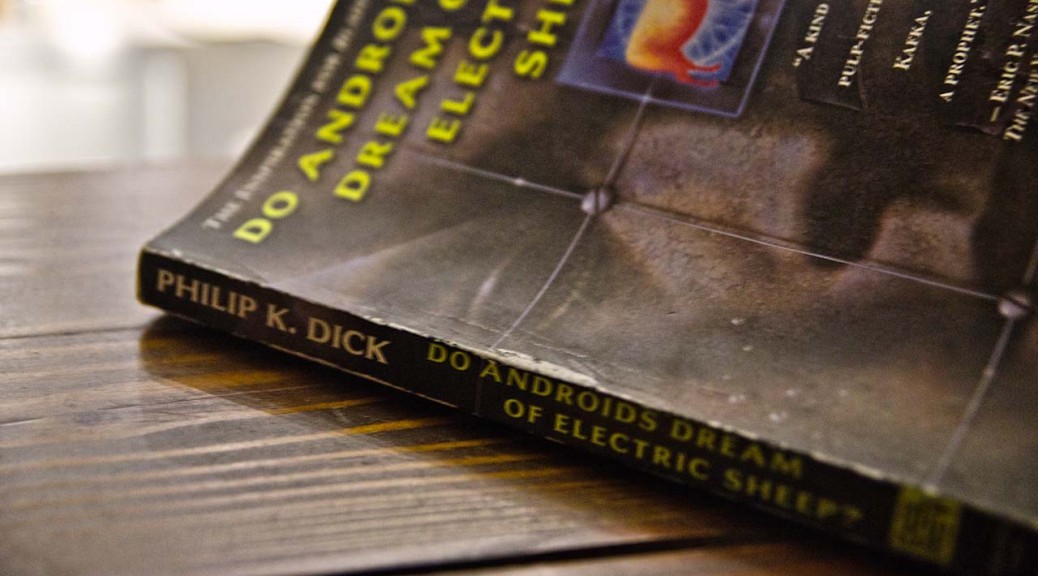
Life Map of Dogs in Korea
 See more at Animals.co.kr and 동물자유연대/ Korean Animal Welfare Association page.
See more at Animals.co.kr and 동물자유연대/ Korean Animal Welfare Association page.

Trimarco
Vallejos, Soledad. Trimarco: la mujer que lucha por todas las mujeres. Argentina: Aguilar, 2013. Print.

A schematic showing global human trafficking, with specific focus to women and children. The map was based mostly on the UNODC map at http://strobelife.files.wordpress.com/2010/06/human_trafficking_map.gif and was accompleted with the moderate countries of origin of this map: http://www.thewe.cc/thewe_/images_5/bbc/_44425220_human_traffick_416map.gif Some simplifications were made; ie some countries on the first map shows that there are countries of both origin and destination; notably Poland, Czech republic, Pakistan, India and China. The exact route of trafficking can be seen (to some degree, maps don’t match fully) at http://www.fas.org/irp/threat/754727.gif A map showing the exact trafficking routes can be found at http://commons.wikimedia.org/wiki/File:Trafficking_of_women,_children_and_men_routes.svg. Via Wikimedia.
Fundacíon María de Los Angeles
Revolución Libertadora (1955-1958)
“el ingenio. Era una masa no tan lehana que humeaba y angustiaba fantasías infantiles con la leyenda tucumana por excelencia: El Familiar, mezcla de espíritu y animal fantástico aterrador; ser con el que el patrón de todo ingenio estaba obligado a pactar si quería una buena zafra. A cambio de salvarlo de la ruina, El Familiar reclamaba como prenda la vida de un cañero al menos una vez al año. Por eso –dice– en los surcos desaparecían obreros.” p. 21
Jardín de la República
La Alianza Anticomunista Argentina (AAA) – Triple A
Horacio Verbitsky | periodista y escritor | derechos humanos / kirchnerista.
“prosíbulos ruteros de las provincias.” p. 61
monja incendiaria (Berta Povalej) “La monja rezaría mucho, pero tenía debilidad por entreverarse en asuntos terrenales.” p. 64
“Las redes de trata existían, el tráfico de mujeres, su explotación sexual en distintas provincias por parte de familias que operaban como pequeñas empresas y se vinculaban entre sí, también.” p. 67
“Hablaba de procesiones, de rituales, de magia negra.” p. 68
“la mención de la Pomba Gira, esa diosa del panteón umbanda, era habitual en el mundo de los tratantes.
–Y me dijo que los tratantes suelen usar ese tipo de rituales como métodos de sometimiento, como forma de doblegar la voluntad de la víctima. Y que son usuales eso rituales, esas ofrendas.
No importa dónde estén ubicados geográficamente: las fotos de los allanamientos a prostíbulos alimentados con mujeres traficadas y esclavizadas coinciden, todavía hoy, en retratar esos altares. Negros las más de las veces, como bañados en la cera de decenas de velas derretidas; presididos por San La Muerte, la Pomba Gira o algún otro santo de imagen impactante y origen sincrético.” p. 69
“Por decreo de Carlos Menem de 1991, cada año en esa fecha, San Miguel se convertía en la capital de la Argentina. Kirchner llegaba a ratificar la tradición, a seis semanas de asumido el cargo: era puro carisma y magnetismo político.” p. 70
“–Ella viene conmigo–dijo secamente la monja en la esquina. Y pasaron la primera valla del operativo de seguridad.
Trimarco se vuelve a asombrar al recordarlo. “Era como si nos hubieran invitado a las dos. Era una cosa que pasábamos sí o sí.”” p. 71
“Desconcertada por lo imprevisto, iba a hacerlo cuando vio a Povalej levantarse rauda y hablar con los hombres, que desistieron enseguida.” p. 72
“Alicia recuerda que todo “era muy triste”. “Vos sabés las veces que yo he ido y a ella le habían cortado la luz, y estaba ahí, entre las velas. Habían vendido todo, porque era que le tenía que poner nafta a los policías, que no les pagaban viáticos, tenía que pagarles el café con leche o la comida.” p. 74
Trimarco y Verón fueron entrevistados en el programa de Guillermo Andino.” p. 77
“agosto de 2004 desaparecería la bióloga alemana Annagreth Würgler.” p. 78
“Susana… Incluso una vez se disfrazó de prostituta y se metió en la zona de los travestis, en La Rioja, averiguando cosas.” p. 79-80
“Dice la causa: “Trimarco investigó la desparición de su hija, entrando al mundo de la noche”” p. 80
“Trimarco contó una vez más todo lo que había pasado desde la última mañana que vio a su hija. “Me contó que se metía en los lugares, ella era muy activa en ir a los lupanares”, recuerda el ex ministro Béliz.” p. 92
lupanares: prostíbulo
“–Graciasm señor presidente.
–No me gias señor presidente, decime Néstor.
–Sí, señor presidente.” p. 95
“Casi sin respirar, agrega Trimarco que alguna otra vez Kirchnerle dijo algo que no puede olvidar.:
–La única que va a aclarar esto sos vos.” p. 96
***”Posse, además, insistía en que los eufemismos no eran tales: “Candy” y “El Desafío” no eran prostíbulos, sino “whiskerías”, las mujeres que estaban allí lo hacían por su propia voluntad y no eran prostitutas, sino coperas que acompañaban a los clientes y tomaban algún trago con ellos.” p. 96
“Desde noviembre Trimarco insistía en que, de acuerdo con varios testimonios, Marita había sido aseinada y enterrada en una whiskeía que pertenecía a Lidia Irma Medina y sus hijos.” p. 102
“Cuatro días después, se había excavado en los patios de los prostíbulos “La isla” y “Candy”. Allí no habían restos humanos.” p. 102
“El cuerpo de Paulina Lebbos apareció a metros de una ruta en las afueras de la capital, un sábado cuando caían el sol. Dos muchachos de campo que pasaban al galope lo vieron y avisaron a la policía. La chica, de 24 años, llegvaba trece días desaparecida.” p. 102
“Periodistas locales que pasaron la noche en guardia al otro lado de la ruta, para no perder pisada de los trabajos policiales, todavía hoy recuerdan el aire viciado, el olor intenso que traía el viento y que se intensificó, más tarde, cuando el cuerpo fue preparado en el patio de la morgue para la autopsia. A Paulina, además, le faltaba parte de una pierna. Luego se sabría que no había muerto en el lugar donde había muerto en el lugar donde había sido hallada, que llevaba días fallecida, que alguien la había escondido y preservado hasta entonces.” 104
“Como erra su costumbre, Trimarco pidió una misa por su hija en la basílica Nuestra Señora de la Merced, la misma en la que Manuel Belgrano había rogado antes de la batalla de Tucumán.” p. 105
“La telenovela Vidas robadas mantendría distancias, pero en el corazón de la historia iba a latir el caso Verón.” p. 118
“Las dos muheres compartían un frente común: a diferencia de Fernández, sostenía que la ley no podía obligar a una víctima de trata a demostrar que había sido forzada, que estaba siendo sometida en contra de su voluntad, que no había dad su consentimiento para ser explotada.” p. 122
“el juicio de Bell Ville, en el que dos chicas secuestradas y explotadas habían sido juzgadas como victimarias de una tercera,” p. 128
Documentary “Fragmentos de una Busqueda” (2009) Dir. Pablo Milstein, Norberto Ludín.
“en la Argentina, de acuerdo con estudios de la Organización Internacional de Migraciones, el 80 por ciento de las víctimas de trata era personas nacidas en el mismo país.” p. 132-133
“un rumor persistente señalaba que en esa zona de La Rioja podía estar Marita, pero ya no viva, sino asesinada y enterrrada a la vera de la ruta, camino a la cordillera. Era una región largamente sospechada. De allí había desaparecido en 2004 la turista suiza Annagreth Würgler.” p. 135
“Quizá el ejemplo más claro fuera el personake de Nacha, la mujer del jefe de la red, una ex víctima explotada que había terminado por enamorar a su captor y convivir con él como su legítima ante los ojos de todos los demás, que ignoraban cómo se habían conocido.” p. 141
“hablaban de bueyes perdidos mientras la luz del día huía.” p. 144
“Si la madre de Marita arremetía contra puertas cuando estaba sola y nadie la escuchaba, acompañada de una cámara y un micrófono, ya premiada y en pleno armado de la Fundación, resultaba implacable.” p. 145
Trimarco: “‘Hago todo esto sin darme cuenta. Como madre, tengo el deber de luchar contra viento y marea para encontrar a mi hija.'” p. 145
“–Entré al Desafío, estructura de dos pisos, varias habitaciones, tipo hotelm un portón al costado. Arriba había un altillo, con un altar a San La Muerte, tenía que ponerle cadenas de oro. El Candy da al fondo de la casa de la Lidia Medina, la casa azul.” p. 157
“Trimarco se ha peleado definitivamente con casi todas las personas que comparten su cotidianeidad.” p. 159
On Trimarco: “Muy directa, muy transparente. Muy franca. Eso es bueno y a veces no tanto, en la relación con ella se generan a veces situaciones por eso. Pero las prefiero”. p. 160
“Piquillín, una pequeña localidad cordobesa. Era jueves. Querían desenterrar restos para saver si la historia de “la tucumanita”, como las prostitutas de los locales “Las vampiras” y “El mote” llamadan al alma en pena de una joven aseinada por proxenetas, se correspondía con la realidad. Si ahí yacía un cuerpo, algunos indicios de testimonios hacían sospechar que podía ser el de Marita Verón.” p. 162
“Pero después, cuando entendés, cada vez que se paraba la máquina, lo que hacías era rezar para que no fuera un hueso humano. Lo que tiraba eran huesos de perro, de pollo…–dice D’Antona.” p. 163
“Ese día, la fiscal abrió uno de los prostíbulos y lo que había no eran habitaciones, sino celdas. “Habitaciones de 3 por 3, colchones en el piso, cuchetas de tres, una sola ventilación, una habitación cuadradita así, no con rejas, sino con barrotes gruesos.”” p. 163
“D’Antona era un penalista que había defendido al ex presidente Carlos Menem en la causa por la explosión de la fábrica de armas de Río Tercero.” p. 165
“insistía en que el caso de Marita era de derechos humanos y ella, Trimarco, una luchadora que encarnaba la continuidad: significaba en el siglo XXI lo que Madres y Abuelas habían significado para el siglo XX.” p. 169
Book: Es Cristo que pasa by Josemaría Escrivá de Balanguer (founder of Opus Dei)
“También en el terreno del juicio por su hija, la figura de Trimarco sirvió de excusa para que terceros delimitaran campos y plantearan confrontación kirchnerismo-antikirchnerismo.” p. 209
El zar tucumano by José Sbrocco (unauthorized biography of José Alperovich)
See article: “Un periodista de Mendoza dice que ‘Marita no fue secuestrada, sino qie ejercía la prostitución por su cuenta.” Contexto magazine. Found in Notas p. 221
“Trimarco criticó a la policía por la ceguera, porque el machismo impedía a los oficiales tomar denuncias, actuar rápido, rescatar a chicas de sus victimarios.” p. 238
“Han afirmado muy bien los miembros del tribunal: lo que necesitan ellos es tener pruebas”, dice, convencida de que los testimonios no lograron aportar la luz suficiente para condenar a nadie.” p. 239
“Stella Maris Córdoba celebró que la ley nueva no dijera que una víctima puede consentir su explotación,” p. 240
“¿Que sufren las víctimas? La desconfianza permanente en el proceso penal, cuando saben que su victimario puede estar caminando a la vuelta de la esquina, amenazando tanto a ella como a su familia.” p. 240
“No importó el partido político: todos los representantes coincidían en la importancia de Trimarco, en la visibilidad que si tenacidad había dado a un tema que, hasta 2002, no figuraba en la agenda política, y mucho menos en la agenda pública.” p. 241
Fiction films on human trafficking: Trade, Srpski film (A Serbian Film), Taken, Nina, La mosca en la ceniza y Tráfico humano (list from wikipedia entry: Trata de personas)
La Mosca en la ceniza (2010) Dir. Gabriela David

To Read (20th Century)
James Baldwin (US) |
Notes of a Native Son, The Fire Next Time, No Name in the Street, The Devil Finds Work
—
Jorge Luis Borges (Argentina)|
Historia universal de la infamia, Ficciones, El Aleph.
—
R. K. Narayan (India)|
Swami and Friends, The Bachelor of Arts, The English Teacher. See his works on mythology/religion (Gods, Demons and Others, The Ramayana) see list of works.
—
Graham Greene (England)|
The Comedians, The Heart of the Matter, A Burnt-Out Case, The Quiet American, The End of the Affair, The Ministry of Fear, Our Man in Havana, Monsignor Quixote
—
Robertson Davies (Canada)|
The Salterton Trilogy, The Cornish Trilogy, The “Toronto Trilogy”
—
Giorgio Bassani (Italia)|
The Garden of the Finzi-Continis
—
Mordechai Richler (Canada)|
The Apprenticeship of Duddy Kravitz, Barney’s Version, Solomon Gursky Was Here
—
Brian Moore (Northern Ireland/Canada)|
Judith Hearne, The Emperor of Ice-Cream, Black Robe
—
Evelyn Waugh (England)|
Decline and Fall, A Handful of Dust, Brideshead Revisited, Sword of Honour
—

Nicolas Poussin, The Dance to The Music of Time, 1640. Wallace Collection, London. Via Wikimedia.
Anthony Powell (England)|
—
Marcel Proust (France)|
—
Robert Musil (Austria)|
—
James Joyce (Ireland)|
Ulysses, Finnegan’s Wake, Dubliners, A Portrait of the Artist as a Young Man
—
Simone de Beauvoir (France)|
The Second Sex, She Came to Stay, The Mandarins
—
Bertolt Brecht (Germany)|
Threepenny Novel, Drums in the Night, The Modern Theatre Is the Epic Theatre.
—
Wole Soyinka (Nigeria)|
Aké: The Years of Childhood, Death and the King’s Horseman, The Lion and the Jewel
—
Jean Cocteau (France)|
Les Enfants Terribles, Les Parents Terribles, Beauty and the Beast, Orpheus
—
Jacques Prévert (France)|
Les Enfants du Paradis, Paroles (wrote scenarios and dialogues for films. See list)
—
Toni Morrison (US)|
Beloved, Song of Solomon, Sula, The Bluest Eye
—
Italo Calvino (Italia)|
Invisible Cities, If on a winter’s night a traveler, Our Ancestors trilogy, Cosmicomics
—
Leonardo Sciascia (Italia)|
Una storia semplice, The Day of the Owl, To Each His Own. See films: Open Doors (1990), Cadaveri Eccellenti (1976) and Il giorno della civetta
—
Cesare Pavese (Italia)|
The Moon and the Bonfires, see translated poems.
—
Natalia Ginzburg (Italia)|
L’inserzione, Family sayings (Lessico famigliare), Caro Michele (film Caro Michele, 1976)
—
Georges Simenon (Belgium)|
Creator of detective Jules Maigret. Maigret and the Yellow Dog, Dirty Snow, Red Lights
—
Milan Kundera (Czech)|
The Unbearable Lightness of Being, The Joke,The Book of Laughter and Forgetting
—
Chinua Achebe (Nigeria) |
Things Fall Apart,No Longer at Ease, Arrow of God, A Man of the People, Anthills of the Savannah, An Image of Africa (lecture on Heart of Darkness)
—
Muriel Spark (Scotland)|
The Prime of Miss Jean Brodie, The Mandelbaum Gate, The Driver’s Seat, Memento Mori
—
Philip Roth (US)|
The Ghost Writer,American Pastoral, Sabbath’s Theater

酸奶 – Beijing

Busan Biennale 2016

Caballero de la Triste Figura

Dog in Gimhae
Kumiko
Watched Kumiko, the Treasure Hunter (2014). Dir. David Zellner. DP: Sean Porter. Music: The Octopus Project.

Do Androids Dream of Electric Sheep?
Dick, Philip K. Do Androids Dream of Electric Sheep? New York: Del Rey, 1996. (First. ed 1968)
“But a mood like that,” Rick said, “you’re apt to stay in it, not dial your way out. Despair like that, about total reality, is self-perpetuating.” p. 6
“First, strangely, the owls had died. At the time it had seemed almost funny, the fat, fluffy white birds lying here and there, in yards and on streets; coming out no earlier than twilight, as they had while alive, the owls escaped notice. Medieval plagues had manifested themselves in similar way, in the form of many dead rats. This plague, however, had descended from above.” p. 15-16
“An android, no matter how gifted as to pure intellect capacity, could make no sense out of the fusion which took place routinely among the followers of Mercerism–an experience which he, and virtually everyone else, including subnormal chickenheads, managed with no difficulty.” p. 30
“Empathy, evidently, existed only within the human community, whereas intelligence to some degree could be found throughout every phylum and order including the arachnida. For one thing, the empathic faculty probably required an unimpaired group instinct; a solitary organism, such as a spider, would have no use for it; in fact it would tend to abort a spider’s ability to survive.” p. 30-31.
“Because, ultimately, the empathic gift blurred the boundaries between hunter and victim, between the successful and the defeated.” p. 31
“It retiring–i.e., killing–and andy, he did not violate the rule of life laid down by Mercer. You shall kill only the killers, Mercer had told them the year empathy boxes first appeared on Earth.” p. 31
“For Rick Deckard an escaped humanoid robot, which had killed its master, which had been equipped with an intelligence greater than that of many human beings, which had no regard for animals, which possessed no ability to feel empathic joy for another life form’s success or grief at its defeat–that, for him, epitomized The Killers. p. 32
“She indicated the owl dozing on its perch; it had briefly opened both eyes, yellow slits which healed over as the owl settled back down to resume its slumber.” p. 43
“Kipple is useless objects, like junk mail or match folders after you use the last match or gum wrappers or yesterday’s homeopage. When nobody’s around, kipple reproduces itself. For instance, if you go to bed leaving any kipple around your apartment, when you wake up the next morning there’s twice as much of it. It always gets more and more.” p. 65
***””No one can win against kipple,” he said, “except temporarily and maybe in one spot, like in my apartment I’ve sort of created stasis between the pressure of kipple and nonkipple, for the time being. But eventually I’ll die or go away, and then the kipple will again take over. It’s a universal principle operating throughout the universe; the entire universe is moving toward a final state of total, absolute kippleization.” He added, “Except of course for the upward climb of Wilbur Mercer.”” p. 65-66
“Every day he declined in sagacity and vigor. He and the thousands of other specials throughout Terra, all of them moving toward the ash heap. Turning into living kipple.” p. 73
“This rehearsal will end, the performance will end, the singers will die, eventually the last score of the music will be destroyed in one way or another; finally the name “Mozart” will vanish, the dust will have won.” p. 98
“An android,” he said, “doesn’t care what happens to another android. That’s one of the indications we look for.” p. 101
quondam
“disemelevatored” p. 126
Edvard Munch

Edvard Munch | The Scream (1893)
“The creature stood on a bridge and no one else was present; the creature screamed in isolation. Cut off by–or despite–its outcry.” p. 130

Edvard Munch | Puberty (1894-95)
Puberty. 1894-95 p. 131, 133
“She was really a superb singer, he said to himself as he hung the receiver, his call completed. It don’t get it; how can a talent like that be a liability to our society? But it wasn’t the talent, he told himself; it was she herself.” p. 137
“”You realize,” Phil Resch said quietly, “what this would do. If we include androids in our range of empathic identification, as we do animals.”
“We couldn’t protect ourselves.”” p. 141
“He had an indistinct, glimpsed darkly impression: of something merciless that carried a printed list and a gun, that moved machine-like through the flat, bureaucratic job of killing. A thing without emotions, or even a face; a thing that if killed got replaced immediately by another resembling it. And so on, until everyone real and alive had been shot.” p. 158
“But what does it matter to me? I mean, I’m a special; they don’t treat me very well either,” p. 163 (Isidore to Roy Baty)
“Rick said, “I took a test, one question, and verified it; I’ve begun to emphathize with androids,” p. 174
“The old man said, “You will be required to do wrong no matter where you go. It is the basic condition of life, to be required to violate your own identity. At some time, every creature which lives must do so. It is the ultimate shadow, the defeat of creation” p. 179
“Mercer talked to me but it didn’t help. He doesn’t know any more than I do. He’s just an old man climbing a hill to his death.” p. 179
“Do androids dream? Rick asked himself. Evidently: that’s why they occasionally kill their employers and flee here. A better life, without servitude.” p. 184
“this android stole, and experimented with, various mind-fusing drugs, claiming when caught that it hoped to promote in an androids a group experience similar to that of Mercerism,” p. 185
“Because without the Mercer experience we just have your word that you feel this empathy business” p. 209
“”The legs of toads are weak,” Rick said. “That’s the main difference between a toad and a frog, that an water. A frog remains near water but a toad can live in the desert” p. 240
“”The killers that found Mercer in his sixteenth year, when they told him he couldn’t reverse time and bring things back to life again. So now all he can do is move along with life, going where it goes, to death.” p. 242










